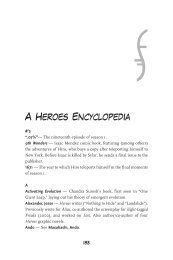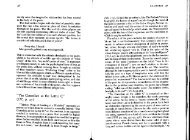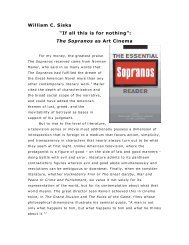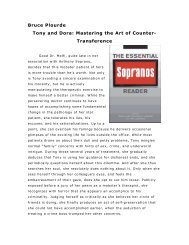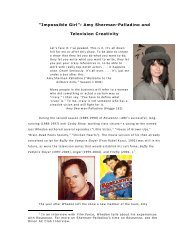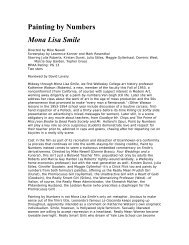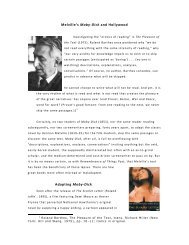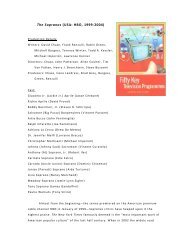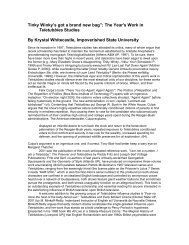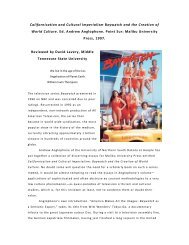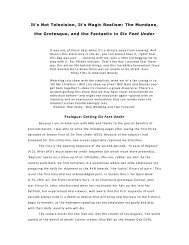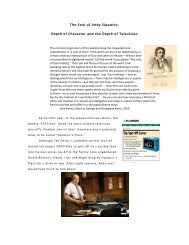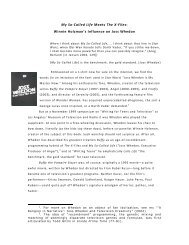The Shadow of His Equipage: Loren Eiseley and ... - David Lavery
The Shadow of His Equipage: Loren Eiseley and ... - David Lavery
The Shadow of His Equipage: Loren Eiseley and ... - David Lavery
Create successful ePaper yourself
Turn your PDF publications into a flip-book with our unique Google optimized e-Paper software.
<br />
<br />
<strong>The</strong> <strong>Shadow</strong> <strong>of</strong> <strong>His</strong> <strong>Equipage</strong>: <br />
<strong>Loren</strong> <strong>Eiseley</strong> <strong>and</strong> Animals <br />
[<strong>The</strong> real goal <strong>of</strong> science is to underst<strong>and</strong>] the essence <strong>of</strong> what our <br />
species has been <strong>and</strong> still is, beyond thought <strong>and</strong> beneath society: an <br />
essence that may be vouchsafed to us in a mineral more beautiful than <br />
any work <strong>of</strong> Man; in the scent, more subtly evolved than books, that <br />
lingers in the heart <strong>of</strong> a lily; or in wink <strong>of</strong> an eye, heavy with patience, <br />
serenity, mutual forgiveness, that sometimes, through an involuntary <br />
underst<strong>and</strong>ing, one can exchange with a cat. <br />
Claude Levi‐Strauss, Tristes Tropiques (473‐74) <br />
Once a fear pierced him <br />
In that he mistook <br />
<strong>The</strong> shadow <strong>of</strong> his equipage <br />
For blackbirds. <br />
Wallace Stevens, "Thirteen Ways <strong>of</strong> Looking at <br />
a Blackbird" (Collected Poems 94) <br />
In [the] labyrinth [<strong>of</strong> the self] where it seems one must trust to blind <br />
instinct, there is, von Franz points out, one—only one—consistent rule <br />
or “ethic”: "Anyone who earns the gratitude <strong>of</strong> animals, or whom they <br />
help for any reason, invariably wins out. This is the only unfailing rule <br />
that I have been able to find." Our instinct, in other words, is not <br />
blind. <strong>The</strong> animal does not reason, but it sees. And it acts with <br />
certainty, it acts "rightly," appropriately. That is why all animals are <br />
beautiful. It is the animal who knows the way, the way home. It is the <br />
animal within us, the primitive, the dark brother, the shadow soul, <br />
who is the guide. <br />
Ursula K. Le Guin, <strong>The</strong> Language <strong>of</strong> the Night (57; my italics) <br />
I. <strong>The</strong> Guide <br />
"Fox masks, wolf masks, I try them on," <strong>Loren</strong> <strong>Eiseley</strong> explains in a poem entitled <br />
"<strong>The</strong> Changeling," "as if I were a savage,” pursuing “phrenological attempts to see /
<strong>The</strong> Collected Works <strong>of</strong> <strong>David</strong> <strong>Lavery</strong> 2<br />
the beast in man . . .” (Notes 19). As a result <strong>of</strong> this preoccupation, <strong>Eiseley</strong>'s essays <br />
<strong>and</strong> poems are studded with a poet/naturalist's acute observations, both charming <br />
<strong>and</strong> insightful, about the animal world: a cat named Maddy who bows repeatedly to <br />
garner human applause (Strange 128‐138); a beaver which prompts a meditation on <br />
the validity <strong>of</strong> teleology in science (Notes 42‐43); a crane in a zoo which inspires <br />
<strong>Eiseley</strong> to join it in a mating dance (Strange 152‐53); a catfish, found almost frozen <br />
in river ice, which dem<strong>and</strong>s <strong>of</strong> its discoverer that he get it a tank (Immense 21‐23); a <br />
snow leopard in a cage whose unceasing gaze cannot be imprisoned (Notes 34); an <br />
"innocent fox" which teaches him that the world "as it begins for all things" is really <br />
"a child's universe, a tiny <strong>and</strong> laughing universe" (Unexpected 210‐11); a hunting <br />
poodle named Beau that lives in a smell prison "in which the contours <strong>and</strong> direction <br />
change with every gust <strong>of</strong> air" (Invisible 38‐40), a sparrow hawk still living, even in <br />
the midst <strong>of</strong> a big city l<strong>and</strong>scape, in "the time before man" (Autumn 88). <br />
<strong>Eiseley</strong>'s writings again <strong>and</strong> again attempt to answer the question he once <br />
posed in a poem: "How does a man [<strong>and</strong> a scientist] say to his fellows / he has been <br />
enchanted / by a bird?” (Notes 69). Animals are to the totemic mind, as Levi‐Strauss <br />
observes, “things with which to think“ <strong>and</strong> not merely objects. In <strong>Eiseley</strong>'s totemism <br />
they likewise provide an essential means for thought: because they are the natural <br />
world’s true natives, in thinking out their place in the structure <strong>of</strong> his own <br />
imagination he reconstructs an important chapter <strong>of</strong> his own autobiography. <br />
Because he perceived himself to be a "changeling" "born from a fourth <br />
dimension" (Notes 21); because he understood that through time <strong>and</strong> evolution he is <br />
genealogically related, in mind <strong>and</strong> body, to the animal world; because he knew that <br />
his own thoughts <strong>and</strong> perceptions, <strong>and</strong> indeed his whole personality, have "rooted <br />
their way up"—out <strong>of</strong> the "triune brain" 1 —"through dynasties <strong>of</strong> neocortex" <br />
(Innocent 23), <strong>Eiseley</strong> retained a lifelong fascination with the creature world, a <br />
fascination which came naturally enough to his evolutionary imagination: "I see <br />
animal faces as readily as though I sat with my mother's one blighted gift in a Cro‐<br />
Magnon cave," he explains. "<strong>The</strong> religious forms <strong>of</strong> the present leave me unmoved. <br />
My eye is round, open <strong>and</strong> undomesticated as an owl's in a primeval forest—a world <br />
that for me has never truly departed" (Strange 139). It is in the ways <strong>of</strong> animals that <br />
1 <strong>The</strong> theory <strong>of</strong> the triune brain—that the distinctly human neo‐cortex evolved <br />
out <strong>of</strong> <strong>and</strong> still remains uncomfortably linked to, the the “lower” “reptilian” <strong>and</strong> <br />
“mammalian” brain—was first proposed by biologist Paul McLean. See Hampden <br />
Turner, Maps <strong>of</strong> the Mind for a discussion <strong>of</strong> McLean’s ideas.
<strong>The</strong> Collected Works <strong>of</strong> <strong>David</strong> <strong>Lavery</strong> 3<br />
he most clearly feels the presence <strong>of</strong> what Martin Buber called “the world order” 2 ("I <br />
had a growing feeling that miracles were particularly concerned with life, with the <br />
animal aspect <strong>of</strong> things," he writes [Unexpected 200]); <strong>and</strong> it is in large part by their <br />
example that he hopes to find a way <strong>of</strong> conquering his own alienation <strong>and</strong> <br />
surmounting his own longing. Since childhood, animals had served as guides for his <br />
vision quest; he pays close heed to their pedagogy. Animals, he seems to sense, know <br />
the way home. <br />
<br />
Like many men, <strong>Eiseley</strong>'s lifelong attempt to "effect his own escape" began <br />
innocently enough in childhood when he tried to run away from home. He was in <br />
flight from an environment he found suffocating <strong>and</strong> a deaf mother whose harsh, <br />
discordant voice <strong>and</strong> fits <strong>of</strong> madness menaced him as a child <strong>and</strong> haunted him until <br />
his death. Climbing aboard a neighborhood delivery truck, <strong>Eiseley</strong> tells us in "<strong>The</strong> <br />
Gold Wheel" in <strong>The</strong> Night Country, he soon found himself outside the city limits, <br />
embarked on his "first great adventure into the outer wilderness." <strong>The</strong> journey itself, <br />
he later remembered, was "the most marvelous ride I shall ever make in this life. . . . <br />
On that day . . . we were moving through the kind <strong>of</strong> eternal light which exists only in <br />
the minds <strong>of</strong> the very young." But afraid <strong>of</strong> continuing too far into the unknown, the <br />
young <strong>Eiseley</strong> jumps from the wagon <strong>and</strong>, since a heavy thunderstorm has come up, <br />
hides immediately in a nearby hedgerow. <strong>The</strong>re, in the midst <strong>of</strong> that secret world, <br />
<strong>Eiseley</strong> gradually begins to realize that he is not alone: <br />
<br />
In that hedge where I crouched . . . were hundred <strong>of</strong> brown birds, strangers <br />
sitting immovable <strong>and</strong> still. <strong>The</strong>y paid no attention to me. In fact, they were <br />
immersed in a kind <strong>of</strong> waiting silence so secret <strong>and</strong> immense that I was much <br />
too overawed to disturb them. Instead, I huddled into that thin world beneath <br />
the birds while the storm leaped <strong>and</strong> flickered as though hesitating whether <br />
2 In I <strong>and</strong> Thou, Buber distinguishes between what he calls “the ordered world” <br />
<strong>and</strong> “the world order.” <strong>The</strong> former is the natural world as shaped <strong>and</strong> reshaped by <br />
human logic <strong>and</strong> structure. <strong>The</strong> latter names being beyond any possibility <strong>of</strong> human <br />
organization or ordering. We may live our lives within “the ordered world,” oblivious <br />
to the presence <strong>of</strong> the world order from which we—<strong>and</strong> all things—sprang, Buber <br />
observes, but we cannot die into it; at death we are again alone with the world <br />
order.
<br />
<strong>The</strong> Collected Works <strong>of</strong> <strong>David</strong> <strong>Lavery</strong> 4<br />
to harry us out <strong>of</strong> our refuge into the rolling domain <strong>of</strong> the clouds. Today I <br />
know that those birds were migrating <strong>and</strong> had sought shelter from exhaustion. <br />
<strong>The</strong> storm eventually subsides <strong>and</strong> <strong>Eiseley</strong>, his escape attempt frustrated, turns <br />
homeward, but he "felt in the process some obscure sense <strong>of</strong> loss. It was as though I <br />
had been on the verge <strong>of</strong> a great adventure into another world that eluded me; the <br />
green light had passed away from the fields." <strong>The</strong> incident constituted for <strong>Eiseley</strong> a <br />
major point <strong>of</strong> departure, for he remained thereafter, by his own admission, always a <br />
“fugitive,“ forever on a prodigal journey <strong>of</strong> flight away from home, <strong>and</strong> the trappings <br />
<strong>of</strong> adulthood <strong>and</strong> maturity, which he donned daily to meet the world, he knew to be <br />
only a kind <strong>of</strong> mimicry, "the protective coloration” <strong>of</strong> a creature pretending to be a <br />
man <strong>and</strong> a university pr<strong>of</strong>essor when his real allegiance was elsewhere: "I should <br />
have stayed under the hedge with the birds" (Night 9‐12). <br />
Among the Blackfeet Indians <strong>of</strong> the American West there exists a myth, as <br />
<strong>Eiseley</strong> himself explains in <strong>The</strong> Unexpected Universe, which tells how the tribe's <br />
earliest ancestors, not knowing how to live in the strange new world where they <br />
found themselves "poor <strong>and</strong> naked,” implored their maker "Old Man" to assist them <br />
in their plight, only to be advised by their creator to "Go to sleep <strong>and</strong> get power. <br />
Whatever animals appear in your dream, pray <strong>and</strong> listen." <strong>The</strong> tale, <strong>Eiseley</strong> <br />
comments, has an "elemental ring," for it is, in fact, "the story <strong>of</strong> an orphan—man—<br />
bereft <strong>of</strong> instinctive instruction <strong>and</strong> dependent upon dream, upon, in the end, his <br />
own interpretation <strong>of</strong> the world. He has to seek animal helpers because they alone <br />
remembered what was to be done" (Unexpected 113). <br />
Like the Blackfeet, <strong>Eiseley</strong> understood that as both a man <strong>and</strong> a writer he too <br />
did not know how to live, <strong>and</strong> he never forgot the injunction <strong>of</strong> "Old Man" to turn <br />
always to the natural world <strong>and</strong> its more experienced inhabitants in order to discover <br />
"what was to be done." <strong>Eiseley</strong>'s near mystical underst<strong>and</strong>ing <strong>of</strong> the ways <strong>of</strong> animals <br />
was the legacy <strong>of</strong> that first glimpse into the creaturely during his youthful escape <br />
attempt: the birds in that hedgerow had appeared to him to be almost magical simply <br />
because they were autochthonal creatures, what the poet Rilke called "great <br />
accustomed things," sprung from the earth <strong>and</strong> at peace within it. Even their <br />
migration was the result <strong>of</strong> adaptation; they did not journey into the distance out <strong>of</strong> <br />
longing, nor did they feel the call <strong>of</strong> destiny which has prompted Homo sapiens. But <br />
could such resignation to the ways <strong>of</strong> the earth—the change <strong>of</strong> the seasons, the <br />
upheaval <strong>of</strong> a storm—ever be mankind’s? This question lies at the heart <strong>of</strong> <strong>Eiseley</strong>'s
<strong>The</strong> Collected Works <strong>of</strong> <strong>David</strong> <strong>Lavery</strong> 5<br />
autobiographical meditations. During his childhood flight he had sensed the presence <br />
<strong>of</strong> "another world" he was then unable to reach; in adulthood he again sought to <br />
enter it, to make "the green light <strong>of</strong> enchantment" return to the fields. <br />
<br />
<br />
<br />
<br />
II. <strong>The</strong> Night Country <br />
<strong>The</strong> descent beckons as the ascent beckoned. <br />
William Carlos Williams, Pictures from Brueghel (73) <br />
already the knowing brutes are aware <br />
that we don't feel very securely at home <br />
within our interpreted world. <br />
Rainer Maria Rilke, Duino Elegies (21) <br />
<strong>Eiseley</strong>'s initial attempts to accommodate himself to the natural world, to <br />
become a mere creature, are prevented by his sense that nature is a realm inimical <br />
to mankind's nature, a “Night Country" <strong>of</strong> terror, an abyss <strong>of</strong> evil. He even devoted <br />
an entire book (<strong>The</strong> Night Country) to portraying this world <strong>of</strong> inhuman darkness. In <br />
<strong>The</strong> Immense Journey, he explains his first discovery <strong>of</strong> the reality <strong>of</strong> the Night <br />
Country. Once, he removed the cover from an old well <strong>and</strong> discovered, peering over <br />
the rim into its depths, a large spider scurrying about. <strong>The</strong> spider, he realized with a <br />
shock, chose to be there; like those things "that did not love the sun" populating the <br />
vast depths <strong>of</strong> the ocean, the spider desired darkness; the Night Country was its <br />
element (37‐38). <strong>The</strong>re is, <strong>Eiseley</strong> knew, no escaping the somber conclusion that the <br />
"whole infinite ladder <strong>of</strong> life was filled with this backward yearning" (Night 26), a <br />
yearning which totally contradicts humankind's whole symbolic equation <strong>of</strong> light with <br />
the Good, <strong>and</strong> the prospect <strong>of</strong>ten seemed to fill <strong>Eiseley</strong> with terror. <br />
<strong>Eiseley</strong>'s fear, he realized, was not unique. Human beings have always feared <br />
that this "night tide" will one day engulf them <strong>and</strong> all their achievements. Such fear <br />
probably began, he speculates, in our earliest ancestors as they sat by their cave <br />
fires watching the "big eyes" <strong>of</strong> the predators which lurked outside the human circle. <br />
This fear is immense, <strong>Eiseley</strong> knew, because the tide itself is immense: it stretches, <br />
in fact, to the ends <strong>of</strong> the universe. <strong>The</strong> menace <strong>of</strong> this night tide causes us to string <br />
lamps out into country lanes in a futile attempt to conquer its province; it makes us <br />
run down night creatures on the road. In response to the night tide, <strong>Eiseley</strong> realizes,
<strong>The</strong> Collected Works <strong>of</strong> <strong>David</strong> <strong>Lavery</strong> 6<br />
mankind "lights <strong>and</strong> lights in a passion for illumination that is insatiable—a poor day‐<br />
born thing contending against one <strong>of</strong> the greatest powers in the universe" (Night 32). <br />
<strong>The</strong> Night Country even sends "personal messages" to our species upon <br />
occasion, to remind us <strong>of</strong> its threatening presence <strong>of</strong>fstage. <strong>Eiseley</strong> collected such <br />
messages: the rat, described in <strong>The</strong> Night Country, that jumps from an open hotel <br />
window into the bed <strong>of</strong> one <strong>of</strong> <strong>Eiseley</strong>'s friends; the "trickster" rat in All the Strange <br />
Hours which upstages <strong>and</strong> parodies <strong>Eiseley</strong>'s own lecture on restoring "great dead <br />
cities as shrines <strong>of</strong> meditation"; the "millions‐upon‐millions" <strong>of</strong> daddy longlegs <br />
<strong>Eiseley</strong> once unexpectedly encountered while sliding along on his back through a <br />
narrow subterranean passage. <strong>The</strong>se <strong>and</strong> other encounters with the Night Country for <br />
a time drive <strong>Eiseley</strong> further <strong>and</strong> further away from identification with the natural <br />
order <strong>and</strong> make him that much more <strong>of</strong> a fugitive. <br />
<strong>Eiseley</strong> the fugitive finds cause for trepidation in the animal aspect <strong>of</strong> the <br />
world even when it does not show itself as an emblem <strong>of</strong> the ominous Night Country. <br />
After pondering Heraclitus' concept <strong>of</strong> polemos in a poem, for example, he finds in <br />
the Greek idea <strong>of</strong> the elemental strife from which all things are born a possible <br />
subversion <strong>of</strong> the whole progress <strong>of</strong> civilization. For humans <strong>and</strong> animals are at war, <br />
he thinks, in competition for the goods <strong>of</strong> life, <strong>and</strong> there is no guarantee mankind <br />
will win: <br />
<br />
<br />
Polemos, war—tell you <br />
they keep coming, keep coming, <br />
raccoons, foxes, butterflies. <br />
I heard a chipmunk whistle <br />
in the drain pipe. <br />
<strong>The</strong> city is ours <br />
I think, <br />
but less certain now. (Notes 81) <br />
To <strong>Eiseley</strong>, the effects <strong>of</strong> polemos are visible everywhere, even in the activities <strong>of</strong> <br />
the most innocent <strong>of</strong> creatures, as he describes in <strong>The</strong> Immense Journey: <br />
I know the sort <strong>of</strong> watch birds keep on us. I've listened to sparrows tapping <br />
tentatively on the outside <strong>of</strong> air conditioners when they thought no one was <br />
listening, <strong>and</strong> I know how other birds test the vibrations that come up to them <br />
through the television aerials.
<br />
<br />
<strong>The</strong> Collected Works <strong>of</strong> <strong>David</strong> <strong>Lavery</strong> 7<br />
“Is he gone?" they ask, <strong>and</strong> the vibrations come up from below, "Not yet, not <br />
yet.” (Immense 187) <br />
In All the Strange Hours, as he watches growing packs <strong>of</strong> wild dogs prowling along <br />
Market Street in Philadelphia, <strong>Eiseley</strong> imagines that the takeover is very far advanced <br />
<strong>and</strong> that the very same dogs he watches may even outlive their masters <strong>and</strong> "still be <br />
waiting when the first wild oak bursts through the asphalt <strong>of</strong> Market Street." Yet <br />
these <strong>and</strong> all dogs may, <strong>Eiseley</strong> thinks, retain even then at least a memory <strong>of</strong> a "dim <br />
h<strong>and</strong> that they all feel but have never known," a "dim memory <strong>of</strong> a visiting god who <br />
could not save himself but whose touch wrought something ineffable." But when that <br />
"racial memory" is no longer experienced, "then man will in truth be gone.” <br />
One <strong>of</strong> those dogs, however, brings a message to <strong>Eiseley</strong>, a message he <br />
communicates only through the licking <strong>of</strong> his tongue, but which <strong>Eiseley</strong>, a scientist <br />
on a vision quest into knowledge, is able to translate into human language: "If you <br />
would come out <strong>of</strong> your doors <strong>and</strong> stonework," the dog pleads with <strong>Eiseley</strong>, "we <br />
could lie here in the dust <strong>and</strong> be safe, as it was in the beginning when you, the gods, <br />
lived close to us <strong>and</strong> we came in to you around the fire." This dog, an emissary from <br />
the Night Country which <strong>Eiseley</strong> had so long feared, delivers a summons, <strong>Eiseley</strong> <br />
discerns, because he simply "did not underst<strong>and</strong> the gods nor why they persisted in <br />
going so far away" (Strange 47‐49; my italics). <br />
<strong>The</strong> dog seems to know intuitively <strong>and</strong> more intensely than we ourselves do <br />
how human longing has alienated the species from the creaturely state. Since that <br />
day in his childhood when he had waited patiently in a hedgerow among migrating <br />
birds, <strong>Eiseley</strong> knew that he too had journeyed "far away," into a solely human, adult <br />
realm in which his primary relationship to his world had become, to use a favorite <br />
metaphor <strong>of</strong> the American poet Robinson Jeffers, "incestuous"—where he has <br />
intercourse only within his own limited human family to the neglect <strong>of</strong> the natural <br />
world from which he sprang. It is only from this perspective, as he came to realize, <br />
that the creaturely appears to his own prodigal imagination to be a Night Country. <br />
But such a realization required <strong>of</strong> <strong>Eiseley</strong> a redirection <strong>of</strong> his odyssey—a momentary <br />
divagation from pursuit <strong>of</strong> the distance <strong>and</strong> mankind's immense journey—which <br />
comes for him in the form <strong>of</strong> a descent. <br />
<strong>The</strong> necessity <strong>of</strong> the descent in the attainment <strong>of</strong> wisdom has always been a <br />
theme <strong>of</strong> the world's literature, as the journeys into hell <strong>of</strong> Odysseus, Hercules,
<strong>The</strong> Collected Works <strong>of</strong> <strong>David</strong> <strong>Lavery</strong> 8<br />
Aeneas, <strong>and</strong> Dante illustrate well. In the world's literature <strong>and</strong> mythology, the <br />
descent traditionally serves as a means <strong>of</strong> acquiring the wisdom necessary for the <br />
completion <strong>of</strong> a journey, as in Aeneas' consultation with his father in Hades, or <br />
Odysseus' seeking out <strong>of</strong> Tiresias, or Dante's passage through the Inferno. <strong>The</strong> <br />
descent <strong>of</strong> <strong>Loren</strong> <strong>Eiseley</strong>, an autobiographical one, involved—in keeping with the <br />
traditional vision quest <strong>of</strong> primitive peoples—the mediumship <strong>of</strong> animals, the true <br />
spirits <strong>of</strong> the Night Country, into an underworld which at one time seemed to <strong>Eiseley</strong> <br />
to lie far below the powers <strong>of</strong> human illumination. With this descent, <strong>Eiseley</strong> slowly <br />
begins to reclaim for himself the heritage <strong>of</strong> creatureliness which he had once <br />
ab<strong>and</strong>oned. <br />
In "Big Eyes <strong>and</strong> Small Eyes" in <strong>The</strong> Night Country, <strong>Eiseley</strong> describes a difficult <br />
cross‐country journey he once made over a western mountain range to a nearby city. <br />
"I will not say where the journey began," he explains cryptically at the outset; what <br />
we do learn, however, is that the journey was for him free from care, at least <br />
initially: "I was complete in myself like a young migrating animal whose world exists <br />
totally in the present moment.” (He had repossessed, it would seem, the magical <br />
sense he had felt in childhood in the hedgerow with the birds.) But the journey soon <br />
becomes for various reasons—the onset <strong>of</strong> night, his growing weariness—more <strong>and</strong> <br />
more difficult, until at its end he faces the stern test <strong>of</strong> descending a sharp <br />
escarpment which presents the final obstacle between himself <strong>and</strong> the city below it—<br />
his destination. Halfway down the dangerous cliff, <strong>Eiseley</strong> hears the frenzied barking <br />
<strong>of</strong> guard dogs from a mine located at its foot, <strong>and</strong> although he fears their likely <br />
attack, he has, he realizes, little choice but to drop from his perch on the side <strong>of</strong> the <br />
cliff directly into their midst. <br />
To his great astonishment, however, he finds that “the great hounds, with the <br />
total irrationality that prevails over the sheer cliff <strong>of</strong> Chaos, leaped <strong>and</strong> bounded <br />
about me as though I were their returning master." Gradually their behavior becomes <br />
clear to his clairvoyant eye: "Did they take me,” he asks, "because <strong>of</strong> my successful <br />
descent as a demon like themselves—for if I had fallen, they had given every <br />
indication <strong>of</strong> devouring me—or are the dogs <strong>of</strong> Cerberus, the hoarse‐voiced, much <br />
feared guardian <strong>of</strong> Darkness, actually abysmally lonely <strong>and</strong> friendly creatures?” <br />
Having been accepted as a fellow creature, proven to be so because <strong>of</strong> his <br />
accomplishment, <strong>Eiseley</strong> comes to see his descent as a redirection <strong>of</strong> his prodigal <br />
journey. He vanquishes his fear <strong>of</strong> the dark <strong>and</strong> consequently underst<strong>and</strong>s that even <br />
a descent into hell is an assailable phase <strong>of</strong> the human journey: "When I come to the
<strong>The</strong> Collected Works <strong>of</strong> <strong>David</strong> <strong>Lavery</strong> 9<br />
Final Pit in which they howl," he explains, “I shall, without too great a show <strong>of</strong> <br />
confidence, put out my h<strong>and</strong> <strong>and</strong> speak once more. Perhaps the great hounds <strong>of</strong> fear <br />
may wait with wagging tails for a voice which knows them" (Night 27‐44). <br />
Like Rilke, <strong>Eiseley</strong> is thus able to see that "perhaps everything terrible is in its <br />
deepest being something helpless that wants help from us” (xxx), <strong>and</strong> thus he begins <br />
to feel the call <strong>of</strong> the ascent <strong>and</strong> the resumption <strong>of</strong> his journey. He then feels himself <br />
becoming one with the animal world: "My thoughts are becoming animals," he even <br />
tells us in a poem (Notes 37) . But while the spectre <strong>of</strong> the Night Country threatened <br />
<strong>Eiseley</strong> with alienation from the world order, identification with the animal world <br />
brings with it a corresponding danger for him: the temptation to ab<strong>and</strong>on <strong>The</strong> <br />
Immense Journey short <strong>of</strong> completion <strong>and</strong> thereby to rob it <strong>of</strong> all meaning. <br />
<br />
<br />
<br />
III. Defecting <br />
When I saw that clumsy crow <br />
Flap from a wasted tree, <br />
A shape in the mind rose up: <br />
Over the gulfs <strong>of</strong> dream <br />
Flew a tremendous bird <br />
Further <strong>and</strong> further away <br />
Into a moonless black, <br />
Deep in the brain, far back. <br />
<strong>The</strong>odore Roethke, "Night Crow" (Collected Poems 47) <br />
Chuang‐tzu, the famous Taoist philosopher, dreamed one night that he was a <br />
grasshopper, a dream which caused him to wonder upon awakening, so the story <br />
informs us, whether he was not, rather, a grasshopper dreaming he was a man. <br />
In "Thirteen Ways <strong>of</strong> Looking at a Blackbird," the American poet Wallace <br />
Stevens tells <strong>of</strong> a man who "rode over Connecticut in a glass coach" <strong>and</strong> came to <br />
experience a sense <strong>of</strong> puzzlement about the human condition nearly the equal <strong>of</strong> <br />
Chuang‐tzu's. Stripped <strong>of</strong> the normally ever‐present frame <strong>of</strong> the “ordered world” in <br />
his means <strong>of</strong> conveyance, the man perceives from his “glass coach” a world which is, <br />
perhaps for the first time, transparently clear to him <strong>and</strong> senses the presence <strong>of</strong> <br />
another order <strong>of</strong> being. <strong>His</strong> vision becomes, in fact, so clairvoyant that, as Stevens <br />
informs us,
<br />
<br />
Once, a fear pierced him <br />
In that he mistook <br />
<strong>The</strong> shadow <strong>of</strong> his equipage <br />
For blackbirds. <br />
<strong>The</strong> Collected Works <strong>of</strong> <strong>David</strong> <strong>Lavery</strong> 10<br />
Like Chuang‐tzu, Stevens' coach rider has for the moment forgotten the distinctions <br />
between man <strong>and</strong> animal, the seer <strong>and</strong> the seen, <strong>and</strong> as Stevens explains earlier in <br />
the poem, to be so forgetful is to attain a new kind <strong>of</strong> underst<strong>and</strong>ing: for it is to see <br />
that <br />
<br />
<br />
A man <strong>and</strong> a woman <br />
Are one. <br />
A man <strong>and</strong> a woman <strong>and</strong> a blackbird <br />
Are one. <br />
But even this underst<strong>and</strong>ing, as Stevens makes clear, is, at first acquisition, a <br />
piercing fear; for it involves nothing less than a loss <strong>of</strong> human identity <strong>and</strong> a merger <br />
with the world <strong>of</strong> the creature <br />
<br />
<strong>The</strong> "line" which separates the human <strong>and</strong> animal world, <strong>Eiseley</strong> knew, is a thin one <br />
<strong>and</strong> not always apparent: it is "like an invisible wall, a line you can't see," <strong>and</strong> yet it <br />
is everywhere, a net running through one's brain as well as the outside world" (Night <br />
12). A major function <strong>of</strong> civilized religion, <strong>Eiseley</strong> liked to think, is to prevent <br />
mankind from straying too near or crossing over such a line <strong>of</strong> demarcation (Invisible <br />
150‐51). But animals themselves know <strong>of</strong> its existence, even when we do not: "birds <br />
sit on those lines <strong>and</strong> you never knew which side the birds were on because they sat <br />
so quietly <strong>and</strong> were waiting" (Night 12). <br />
<strong>Eiseley</strong> <strong>of</strong>ten felt the shudder which accompanies crossing over the line <strong>and</strong> <br />
the subsequent confusion <strong>of</strong> realms; he experienced it both at first <strong>and</strong> second h<strong>and</strong>. <br />
In an essay left unpublished at his death, "<strong>The</strong> Dance <strong>of</strong> the Frogs" (now to be found <br />
in <strong>The</strong> Star Thrower), <strong>Eiseley</strong> describes perhaps the first time he sensed that the <br />
creaturely constituted the shadow <strong>of</strong> his own equipage. <br />
In "<strong>The</strong> Dance <strong>of</strong> the Frogs," <strong>Eiseley</strong> tells the incredible story <strong>of</strong> Albert Dreyer, <br />
a University <strong>of</strong> Pennsylvania zoologist <strong>and</strong> a specialist in amphibians, who, while
<strong>The</strong> Collected Works <strong>of</strong> <strong>David</strong> <strong>Lavery</strong> 11<br />
conducting an experiment in the woods <strong>of</strong> Pennsylvania on the axolotl, for a moment <br />
lost—like Chuang‐tzu <strong>and</strong> Stevens' blackbird watcher—the customary objectivity <strong>of</strong> <br />
the human condition. As he explains to <strong>Eiseley</strong>, his captive listener in a bar, Dreyer <br />
had, it seems, discovered one night in the woods a large spring migration <strong>of</strong> <br />
thous<strong>and</strong>s <strong>of</strong> peeper frogs heading for nearby waters in order to mate <strong>and</strong> lay eggs. <br />
Feeling, along with the frogs themselves, the "mighty <strong>and</strong> archaic life welling up from <br />
the very ground," <strong>and</strong> with the water <strong>and</strong> "the mother, the ancient life force" pulling <br />
him, Dreyer himself began, by his own account, to follow the frogs' mad skip across <br />
the l<strong>and</strong>, moving in imitation <strong>of</strong> their dance. <br />
But suddenly, as he traveled along what he realized to be a “four‐dimensional <br />
roadway into the world <strong>of</strong> time," Dreyer sensed the presence in the surrounding <br />
darkness <strong>of</strong> "giant batrachian feet joining the dance." <strong>The</strong> feet, Dreyer explained to <br />
<strong>Eiseley</strong>, he believed to be those <strong>of</strong> a "game lord” such as the Indians native to the <br />
area believed in—a gigantic, "immaterial," controller <strong>of</strong> the movements <strong>of</strong> various <br />
species <strong>of</strong> animals, a kind <strong>of</strong> archetype <strong>of</strong> the species itself, an "immortal renewer <strong>of</strong> <br />
substance.” In a trance, Dreyer continued to follow the frogs <strong>and</strong> their leader to the <br />
very edge <strong>of</strong> the water, <strong>and</strong> only at the last moment broke the spell they had cast <br />
upon him before he too, like the frogs, dove into the river. As Dreyer tells his tale, <br />
<strong>Eiseley</strong> (then a young man) looks upon him skeptically, until, in a last attempt to <br />
convince his listener <strong>of</strong> the veracity <strong>of</strong> his tale, Dreyer lifts his h<strong>and</strong>s <strong>and</strong> removes a <br />
glove to reveal that his own h<strong>and</strong> is atavistically webbed between his otherwise <br />
human fingers; the chromosomes <strong>of</strong> the frogs, it seems, are still alive within him <br />
(Star Thrower 106‐115). <br />
In "<strong>The</strong> Judgment <strong>of</strong> the Birds,” <strong>Eiseley</strong> describes one <strong>of</strong> a number <strong>of</strong> his own <br />
experiences <strong>of</strong> existential reversal, experiences that would seem to indicate that <br />
Dreyer's vivid demonstration <strong>of</strong> the presence <strong>of</strong> the creature within us not only <br />
convinced the initially doubting <strong>Eiseley</strong> but made him aware <strong>of</strong> similar presences <br />
within himself. Awakening in a New York City hotel in the very early morning, <strong>Eiseley</strong> <br />
goes to the window to view the coming <strong>of</strong> dawn. Instead he witnesses a deserted city <br />
occupied only by pigeons flying aimlessly about the nearby tall buildings. But then <br />
reality begins to shift before his very eyes: <br />
<br />
As I crouched half asleep across the sill, I had a moment's illusion that the <br />
world had changed in the night, as in some immense snowfall, <strong>and</strong> that if I <br />
were to leave it would have to be as these other inhabitants were doing, by
<br />
<strong>The</strong> Collected Works <strong>of</strong> <strong>David</strong> <strong>Lavery</strong> 12<br />
the window. I should have to launch out into that great bottomless void with <br />
the simple confidence <strong>of</strong> young birds reared high up there among the familiar <br />
chimney pots <strong>and</strong> interposed horrors <strong>of</strong> the abyss. <br />
And he begins to feel, within the tact dimension <strong>of</strong> his own body, invisible wings <br />
beginning to rise in anticipation <strong>of</strong> his coming flight, as if wings are still part <strong>of</strong> his <br />
"equipage" (Immense 166). <br />
Like Albert Dreyer, <strong>Eiseley</strong> came to accept as well the reality <strong>of</strong> the "game <br />
lords" through first h<strong>and</strong> experience. In <strong>The</strong> Unexpected Universe he tells how once <br />
while driving among a lonely forest road at night he saw something racing along <br />
beside his car: <br />
<br />
<br />
It was not an animal; it was a gliding, leaping mythology. I felt the skin crawl <br />
on the back <strong>of</strong> my neck, for this was still the forest <strong>of</strong> the windigo. . . . I was <br />
lost, but I understood the forest. <strong>The</strong> blood that ran in me was not urban. I <br />
almost said not human. (Unexpected 202‐203) <br />
Although he soon realizes that the creature is only a spotted dog, he continues to <br />
believe that he has really seen "an illusory momentarily succession <strong>of</strong> forms, finally, <br />
but momentarily frozen into shape 'dog' by me." "How was I to know it would remain <br />
'dog’?” he asks. "By experience? No, it had been picked by me out <strong>of</strong> a running <br />
weave <strong>of</strong> colors <strong>and</strong> faces into which it would lapse once more as it bounded silently <br />
into the inhuman, unpopulated wood." "We deceive ourselves," <strong>Eiseley</strong> concludes, "if <br />
we think our self drawn categories exist there.” <br />
After the experience, <strong>Eiseley</strong> feels his own "flesh" <strong>and</strong> seemingly unique <br />
personality already slipping like flying mist, like the colors <strong>of</strong> the dog, away from the <br />
little parcel <strong>of</strong> my bones.” Carlos Casteneda's Don Juan would, no doubt, have <br />
explained to <strong>Eiseley</strong> that he had just encountered a supernatural being known as an <br />
"ally.” But <strong>Loren</strong> <strong>Eiseley</strong> needed no Yaqui Indian sorcerer's tutelage to see such <br />
things. <strong>His</strong> evolutionary imagination was his only sorcerer, <strong>and</strong> he routinely <br />
witnessed such encounters with the creaturely <strong>and</strong> felt the presence <strong>of</strong> its shadow <br />
within his body until the mutability <strong>of</strong> form became a given <strong>of</strong> his world. <br />
At the end <strong>of</strong> Darwin’s Century, his scholarly study <strong>of</strong> the development <strong>of</strong> the <br />
idea <strong>of</strong> evolution, <strong>Eiseley</strong> quotes a passage from the notebooks <strong>of</strong> the young Charles <br />
Darwin in which, <strong>Eiseley</strong> observes, the theory <strong>of</strong> evolution was already contained in
<strong>The</strong> Collected Works <strong>of</strong> <strong>David</strong> <strong>Lavery</strong> 13<br />
germ: “If we chose to let conjecture run wild," Darwin wrote, "then animals, our <br />
fellow brethren in pain, disease, suffering <strong>and</strong> fame—our slaves in the most <br />
laborious works, our companions in our amusements—they may partake <strong>of</strong> our origin <br />
in one common ancestor—we may all be melted together.” This vision <strong>of</strong> the unity <strong>of</strong> <br />
evolution's "tangled bank," <strong>Eiseley</strong> claims, constitutes nothing less than "one <strong>of</strong> the <br />
most tremendous insights a living being ever had" (Darwin’s Century 351‐52) It is a <br />
vision that shapes as well all <strong>of</strong> <strong>Eiseley</strong>'s own perceptions <strong>of</strong> animals. <br />
<br />
<br />
<strong>The</strong>re are, <strong>Eiseley</strong> understood, <br />
aspects <strong>of</strong> the world <strong>and</strong> its inhabitants that are eternal, like ripples marked <br />
in stone on fossil beaches. <strong>The</strong>re is a biological preordination that no one can <br />
change. <strong>The</strong>re are seriatim events that only the complete reversal <strong>of</strong> time <br />
could undo. An example would be the moment when the bats dropped into the <br />
air <strong>and</strong> fluttered away from the insectivore line that gave rise to ourselves. <br />
What fragment <strong>of</strong> man, perhaps a useful fragment, departed with them? <br />
Something, shall we say, that had it lingered, might have made a small, brave <br />
twilight difference in the mind <strong>of</strong> man? (Invisible 35) <br />
It is this evolutionary questioning which allowed <strong>Eiseley</strong> to surmount his paralyzing <br />
fear <strong>of</strong> the Night Country; for such questioning brought <strong>Eiseley</strong> to the realization <br />
that—in the words <strong>of</strong> William Blake—"<strong>The</strong> Bat that flits at close <strong>of</strong> Eve / Has left the <br />
Brain that won't Believe." And so he chose instead to include it <strong>and</strong> its capabilities as <br />
part <strong>of</strong> his mind's equipment, rejecting, as did the great Romantic visionary, the <br />
superstitious symbolism which so <strong>of</strong>ten obscures man's apprehension <strong>of</strong> the natural <br />
unity <strong>of</strong> things. Instead, <strong>Eiseley</strong> sought always to incorporate, through the power <strong>of</strong> <br />
his imagination, all those atavistic ways <strong>of</strong> experience which man has, through <br />
biological necessity, ab<strong>and</strong>oned along the way <strong>of</strong> his evolutionary passage, in the <br />
hope that the "small, brave twilight difference" thus recaptured might bring him <br />
needed wisdom in his own Odyssey, might aid him in authentically writing an <br />
autobiography which could serve as a "peace treaty" with things. <br />
Mankind's attempts at underst<strong>and</strong>ing the universe, <strong>Eiseley</strong> observes in <strong>The</strong> <br />
Invisible Pyramid, have involved a tremendous irony: for although we have gained <br />
much knowledge in the effort, we have as well necessarily given away "a part <strong>of</strong> <br />
[ourselves] which can never be regained—the certainty <strong>of</strong> the animal that what it <br />
senses is actually there in the shape the eye beholds. By contrast, [we find
<strong>The</strong> Collected Works <strong>of</strong> <strong>David</strong> <strong>Lavery</strong> 14<br />
ourselves] in Plato's cave <strong>of</strong> illusion. [We have] acquired an interest in the whole <strong>of</strong> <br />
the natural world at the expense <strong>of</strong> being ejected from it <strong>and</strong> returning, all too <br />
frequently, as an angry despoiler” (142). To forget the animal within, then, is to <br />
become what <strong>Eiseley</strong> called (in <strong>The</strong> Invisible Pyramid) a "world eater"—a parasite <br />
upon earth, a destroyer <strong>of</strong> nature's delicate ecological balance. Consequently, <br />
<strong>Eiseley</strong> finds far greater ecological wisdom in the mythology <strong>of</strong> the American Indian <br />
than in that <strong>of</strong> the Greeks. For the Greeks, as <strong>Eiseley</strong> explains in a poem, were only <br />
able to see "in their strong sunlight / . . . the gods as men though immortal . . . ,” <br />
while the Indian knew, thanks to "visions caught by / starving men on hilltops . . . ,” <br />
that we are a "mosaic" <strong>of</strong> all the things <strong>of</strong> the living world, <strong>and</strong> so too must our gods <br />
be (Notes 36‐37). <br />
"All the great civilized religions remain primarily human centered," the poet <br />
Gary Snyder observes; as such they ignore that wisdom attainable only through <br />
communication with the animal world. We now can no longer hear the "language <strong>of</strong> <br />
the birds" which was once so vital a factor in the lives <strong>of</strong> ancient peoples. We now <br />
know nothing <strong>of</strong> the "pure sensual speech" <strong>of</strong> which the mystical shoemaker Jacob <br />
Boehme wrote as late as the seventeenth century. We are, therefore, incapable <strong>of</strong> <br />
realizing, as Snyder has explained, the most pr<strong>of</strong>ound <strong>of</strong> all religious truths: "that we <br />
are many selves looking at each other, through the same eye” (62). And so we dream <br />
<strong>of</strong> voyaging to other planets beyond the Earth in hopes <strong>of</strong> discovering a <br />
"nonterrestrial intelligence" with which to converse <strong>and</strong> thereby to vanquish the <br />
"long loneliness" (Star Thrower 37‐44) which always plagues an alienated creature <br />
like Homo sapiens; we refuse to accept that "Perhaps we have some things still to <br />
learn from the natural world before we turn to the far shores <strong>of</strong> space <strong>and</strong> whatever <br />
creatures may await us there" (Star Thrower 38‐39). <br />
“One does not meet oneself,” <strong>Eiseley</strong> notes in <strong>The</strong> Unexpected Universe, <br />
thinking <strong>of</strong> Argos' recognition <strong>of</strong> his master Odysseus after nineteen years <strong>of</strong> waiting, <br />
"until one catches the reflection from an eye other than human.” For such a meeting <br />
serves to remind us that we are, in fact, prodigal. For "the magic that gleams an <br />
instant between Argos <strong>and</strong> Odysseus," <strong>Eiseley</strong> observes, “is both the recognition <strong>of</strong> <br />
diversity <strong>and</strong> the need for affection across the illusions <strong>of</strong> form. It is nature's cry to <br />
homeless, far‐w<strong>and</strong>ering, insatiable man: 'Do not forget your brethren, nor the green <br />
wood from which you sprang'" (Unexpected 23). By such magic, <strong>Eiseley</strong> knew, even <br />
the hounds <strong>of</strong> hell can be tamed. Yet to attain such a recognition is a near <br />
impossibility in the midst <strong>of</strong> a logically ordered, desecrated "natural” world.
<strong>The</strong> Collected Works <strong>of</strong> <strong>David</strong> <strong>Lavery</strong> 15<br />
Our inability to communicate with animals can be traced, as <strong>Eiseley</strong> shows, <br />
back to our earliest ancestors. When we are first embarked on our time voyage, the <br />
quantum leap our intellectual powers performed brought with it a corresponding <br />
pr<strong>of</strong>anation <strong>of</strong> our world: "Man no longer saw distinct <strong>and</strong> powerful spirits in every <br />
tree or running brook. <strong>His</strong> animal confreres slunk like pariahs soulless from his <br />
presence. <strong>The</strong>y no longer spoke, their influence upon him was broken . . .” (Invisible <br />
14). <strong>The</strong>re has always remained, however, the temptation to rectify this alienation by <br />
returning completely to the animal world in a sort <strong>of</strong> consummate Romanticism. (In <br />
the seventeenth‐century Italian poet Gelli's Circe, <strong>Eiseley</strong> observes, this manifests <br />
itself in Gelli's version <strong>of</strong> the Odysseus legend: in Circe, all but one <strong>of</strong> those whom <br />
Circe transforms into animals refuse to be restored, feeling themselves to be "done <br />
with humanity.") <strong>Eiseley</strong> himself knew the power <strong>of</strong> the temptation. "Sometimes I <br />
think <strong>of</strong> defecting,” he explains in the poem "<strong>The</strong> Last Days": <br />
<br />
<br />
I have begun to hear <br />
trees in the night; <br />
I w<strong>and</strong>er around too much <br />
<strong>and</strong> need replacements. <br />
Animals are beginning to look better <br />
than my own kind; <br />
I request transfer. <br />
Sometimes I think they are talking. <br />
My cat is talking but I don't quite hear. (Notes 82) <br />
<strong>The</strong> sense that he is himself becoming an animal is so great that, as he explains on <br />
numerous occasions, <strong>Eiseley</strong> refused to look into mirrors for fear that he will, like <br />
the legendary Werewolves, actually observe the transformation in progress. <br />
<strong>Eiseley</strong>'s own mentor, the noted anthropologist Frank Speck, once told him <br />
that his proper place was not the modern world, but way back among "the simpler <br />
peoples" like the Iroquois Indians. But even the Iroquois, <strong>Eiseley</strong> knew better, are <br />
not the "right people" with whom he can share a true sense <strong>of</strong> brotherhood. "I <br />
belonged,“ he explains in All the Strange Hours, "further back—back on the altiplano <br />
with the great gray beasts <strong>of</strong> the crossing." To fulfill this most sovereign wish—to re‐<br />
enter the natural order <strong>of</strong> things during the ice age at the very point where <strong>Eiseley</strong> <br />
believed that the "rift"—mankind's separation from biological evolution—began, it
<strong>The</strong> Collected Works <strong>of</strong> <strong>David</strong> <strong>Lavery</strong> 16<br />
was, as <strong>Eiseley</strong> knew, imperative that he ab<strong>and</strong>on every vestige <strong>of</strong> species <br />
chauvinism within himself <strong>and</strong> commit himself willingly to the ultimate heresy <strong>of</strong> <br />
identification with the natural world, accepting willingly the humiliation which <br />
comes with the disavowal <strong>of</strong> the projects <strong>of</strong> the world eaters. This humiliation <br />
<strong>Eiseley</strong> gladly accepted: "I did not care for taxonomic definitions, that was the truth <br />
<strong>of</strong> it," he would confess on the penultimate page <strong>of</strong> his formal autobiography. "I did <br />
not care to be a man, only a being" (Strange 91‐95, 265). <br />
<br />
<br />
<br />
IV. <strong>The</strong> Mockingbird <br />
<strong>The</strong>re is a pr<strong>of</strong>ound, inescapable need for animals that is in all people <br />
everywhere, an urgent requirement for which no substitute exists. It is <br />
no vague, romantic, or intangible yearning, no simple sop to our <br />
loneliness for Paradise. It is as hard <strong>and</strong> unavoidable as the <br />
compounds <strong>of</strong> our inner chemistry. It is universal but poorly <br />
recognized. It is the peculiar way that animals are used in the growth <br />
<strong>and</strong> development <strong>of</strong> the human person, in those most priceless <br />
qualities which we lump together as "mind". . . . Animals are among <br />
the first inhabitants <strong>of</strong> the mind's eye. <strong>The</strong>y are basic to the <br />
development <strong>of</strong> speech <strong>and</strong> thought. Because <strong>of</strong> their part in the <br />
growth <strong>of</strong> consciousness, they are inseparable from a series <strong>of</strong> events <br />
in each human life, indispensable to our becoming human in the fullest <br />
sense. <br />
Paul Shepard, Thinking Animals (2) <br />
<strong>Eiseley</strong>'s longing to be other than human was counterbalanced in his mind by <br />
his vivid underst<strong>and</strong>ing that in the animal world there exists an equally pr<strong>of</strong>ound <br />
desire to attain to the level <strong>of</strong> the human. Animals seem somehow to comprehend <br />
human destiny <strong>and</strong> their relationship to it. <strong>The</strong>y feel for mankind, it is true, a kind <strong>of</strong> <br />
pity—like the dogs on Market Street; but they experience as well something very like <br />
envy. <strong>The</strong>y long to be us. Like Rilke, <strong>Eiseley</strong> knew from close personal observation <strong>of</strong> <br />
animals that <br />
<br />
within the wakefully‐warm beast <br />
there lies the weight <strong>and</strong> care <strong>of</strong> a great sadness.
<br />
For that which <strong>of</strong>ten overwhelms us clings <br />
to him as well,— a kind <strong>of</strong> memory <br />
that what we're pressing after now was once <br />
nearer <strong>and</strong> truer <strong>and</strong> attached to us <br />
with infinite tenderness. <br />
<strong>The</strong> Collected Works <strong>of</strong> <strong>David</strong> <strong>Lavery</strong> 17<br />
This crucial insight—that Homo sapiens represents, in Michael Polanyi's words, "the <br />
ultimate stage in the awakening <strong>of</strong> the world," 3 a stage all life has striven to <br />
achieve—is brought home to <strong>Eiseley</strong> in his memories <strong>of</strong> his childhood pet, a dog <br />
named Mickey. <br />
Mickey, <strong>Eiseley</strong> remembers, was a dog who envied the human advance <strong>and</strong> <br />
"wanted very much to be a genuine human being," though his futile attempts to sit <br />
up to eat at the <strong>Eiseley</strong> dinner table were met only with derisive laughter, <strong>and</strong> his <br />
look <strong>of</strong> shame revealed that he "knew very well he was being mocked for not being <br />
human." No one took his ambition seriously. But Mickey's great desire was no mere <br />
animal whim. As he looks at Mickey's paw print in a half‐century old cement sidewalk <br />
during a visit in middle age to his home town, <strong>Eiseley</strong> underst<strong>and</strong>s that <br />
<br />
<br />
Mickey tried hard to be a human being. And as I stood after the lapse <strong>of</strong> years <br />
<strong>and</strong> looked at the faint impression <strong>of</strong> his paw, it struck me that every ruined <br />
civilization is, in a sense, the mark <strong>of</strong> men trying to be human, trying to <br />
transcend themselves. Like Mickey, none <strong>of</strong> them has quite made it. . . . <br />
(Night 79‐80) <br />
For "Man is not man, he is elsewhere" (Night 54), <strong>Eiseley</strong> reminds. <br />
3 <strong>The</strong> passage referred to in the text (the final words <strong>of</strong> Polanyi’s Personal <br />
Knowledge) reads in full: <br />
<br />
so far as we know, the tiny framents <strong>of</strong> the universe embodied in man are the <br />
only centres <strong>of</strong> thought <strong>and</strong> responsibility in the visible world. If that be so, <br />
the appearance <strong>of</strong> the human mind has been so far the ultimate stage in the <br />
awakening <strong>of</strong> the world; <strong>and</strong> all that has gone before, the strivings <strong>of</strong> a <br />
myriad <strong>of</strong> centres that have taken the risk <strong>of</strong> living <strong>and</strong> believing, seem to <br />
have all been pursuing, along rival lines, the aim now achieved by us up to <br />
this point. (405)
<strong>The</strong> Collected Works <strong>of</strong> <strong>David</strong> <strong>Lavery</strong> 18<br />
Likewise, <strong>Eiseley</strong> comes to realize, it is not mankind alone that experiences <br />
the exchange <strong>of</strong> realms felt by Chuang‐tzu <strong>and</strong> Stevens' crow watcher. Animals too <br />
know a kind <strong>of</strong> existential reversal: <br />
<br />
<br />
To see from an inverted angle, however, is not a gift allotted merely to the <br />
human imagination. I have come to suspect that within their degree it is <br />
sensed by animals, though perhaps as rarely as among men. <strong>The</strong> time has to <br />
be right; one has to be, by chance or intention, upon the border <strong>of</strong> two <br />
worlds. And sometimes these two borders may shift or interpenetrate <strong>and</strong> one <br />
sees the miraculous. (Immense 167) <br />
In "<strong>The</strong> Judgment <strong>of</strong> the Birds" <strong>Eiseley</strong> describes just such an occasion. <br />
Walking toward the campus <strong>of</strong> the University <strong>of</strong> Pennsylvania one morning, <br />
<strong>Eiseley</strong> follows an accustomed path through an extraordinarily heavy early morning <br />
fog. Suddenly jolted by a flutter <strong>of</strong> wings <strong>and</strong> a loud shriek, <strong>Eiseley</strong> recognizes the <br />
cry <strong>of</strong> a familiar crow which had almost collided with him. Gradually <strong>Eiseley</strong> realizes <br />
what had happened. <strong>The</strong> crow which had nearly crashed into him was a regular <br />
around the neighborhood, one <strong>Eiseley</strong> saw every day <strong>and</strong> who, in turn, saw him daily <br />
as well. But in the thick fog he had evidently become momentarily confused: <br />
<br />
<br />
He had thought he was high up, <strong>and</strong> when he encountered me looming <br />
gigantically through the fog, he had perceived a ghastly <strong>and</strong>, to the crow <br />
mind, unnatural sight. He had seen a man walking on air, desecrating the very <br />
heart <strong>of</strong> the crow kingdom, a harbinger <strong>of</strong> the most pr<strong>of</strong>ound evil a crow mind <br />
could conceive <strong>of</strong>—airwalking men. <strong>The</strong> encounter, he must have thought, had <br />
taken place a hundred feet over the ro<strong>of</strong>s. (Immense 169) <br />
Once a fear pierced him, Stevens might have said, in that he mistook the shadow <strong>of</strong> <br />
his equipage for men. <br />
Nor is it our seemingly unique ability to travel through time in inner <br />
experience—a favorite <strong>Eiseley</strong> theme—that truly distinguishes us. Even an animal can <br />
do it, <strong>Eiseley</strong> comprehends one night while playing with his dog Wolf, as he describes <br />
in "<strong>The</strong> Angry Winter." At work on the harvest <strong>of</strong> an archaeological dig, <strong>Eiseley</strong> <br />
throws Wolf the ancient bone <strong>of</strong> a fossil bison over 10,000 years old. Suddenly, <br />
<strong>Eiseley</strong> explains, Wolf begins to snarl <strong>and</strong> bare his teeth, assuming a posture <strong>of</strong>
<strong>The</strong> Collected Works <strong>of</strong> <strong>David</strong> <strong>Lavery</strong> 19<br />
defense. He does so, <strong>Eiseley</strong> grasps, because "ancient shapes were moving in his <br />
mind <strong>and</strong> determining his utterance,” informing him that "only fools give up bones" <br />
in the time <strong>of</strong> ice in which he momentarily found himself <strong>and</strong> signaling him to attack, <br />
if necessary, his master, the "most beloved object in his universe." But the dog, <br />
<strong>Eiseley</strong> knew, did not really want to strike; in his "strained <strong>and</strong> desperate eyes" <br />
<strong>Eiseley</strong> reads another message which the animal does not have the words to <br />
otherwise express: <br />
<br />
<br />
Do not . . . force me. I am what I am <strong>and</strong> cannot be otherwise because <strong>of</strong> the <br />
shadows. Do not reach out. You are a man <strong>and</strong> my very god. I love you, but do <br />
not put out your h<strong>and</strong>. It is midnight. We are in another time, in the snow. <br />
(Unexpected 94‐95) <br />
Through the power <strong>of</strong> an atavistic instinct alone, Wolf had returned to that same <br />
spot in time in which <strong>Eiseley</strong> himself sought refuge, to that very moment in <br />
evolution—before the rift opened between the human <strong>and</strong> the animal—into which <br />
<strong>Eiseley</strong> hoped to die. And at the end <strong>of</strong> All the Strange Hours, his last major <br />
published work, <strong>Eiseley</strong> does join Wolf—his Argos—in the shadows <strong>of</strong> that instinctive <br />
world, in a verbal passage toward death that presaged <strong>Eiseley</strong>'s own real one two <br />
years later, "muffled in snow upon the altiplano” (Strange 266). But the passage to <br />
that world is for <strong>Eiseley</strong> a difficult one, an Odyssey, <strong>and</strong> not to be navigated merely <br />
through an atavistic escape. <br />
In mankind's search for a return to nature, an end to his prodigal journey <br />
beyond the biological into time, <strong>and</strong> our pursuit <strong>of</strong> a proper death, animals can, <br />
<strong>Eiseley</strong> knew, serve as an inspiration <strong>and</strong> a guide, as they did once for the totemic <br />
mind; but we need more than they can ever finally give: for we seek, he tells us in <br />
the poem "<strong>The</strong> Bats," the attainment <strong>of</strong> the "Peace that long ago was said to pass / <br />
beyond underst<strong>and</strong>ing." Raising his poetic voice in prayer, <strong>Eiseley</strong> asks, however, <br />
that such peace be conferred on all living things as well, not just on the human: <br />
"Give it to all your creatures, / for we too are a part <strong>of</strong> them as they <strong>of</strong> us / entwined <br />
in one great whole that cannot keep / the mind from terror so long as one lost leaf / <br />
upon the pavement struggles within its solitude to rise" (Notes 89). <strong>The</strong> "leaf" <strong>of</strong> <br />
which he speaks is, in reality, a bat which once came miraculously back to life at his <br />
feet; thus <strong>Eiseley</strong>'s prayer seeks to redeem the Night Country, to lift its darkness into <br />
the realm <strong>of</strong> light <strong>and</strong> underst<strong>and</strong>ing.
<strong>The</strong> Collected Works <strong>of</strong> <strong>David</strong> <strong>Lavery</strong> 20<br />
To pray in this way is to begin to create “an ethic not alone directed toward <br />
his fellows, but extended to the living world around him"; it is an attempt to <br />
establish a presence before the world in which "by way <strong>of</strong> his cultural world, man can <br />
attempt an actual conscious re‐entry into the sunflower forest he had thought <br />
merely to exploit or ab<strong>and</strong>on." This feat humans can accomplish only alone: "for man <br />
himself must be his last magician. He must seek his own way home" (Invisible 155). <br />
And this humans alone can do because we are, as a species, like those water striders <br />
<strong>Eiseley</strong> writes <strong>of</strong> in a poem, "a strider over light <strong>and</strong> air," a creature <strong>of</strong> two realms, <br />
who "glides magnificently upon a web <strong>of</strong> music <strong>and</strong> <strong>of</strong> light," while below, under the <br />
sway <strong>of</strong> the Night Country, "Something . . . contends against the dark,” <strong>and</strong> although <br />
it does not always win, that part <strong>of</strong> us which lives within the light <br />
<br />
<br />
wins enough <br />
that music rises <strong>and</strong> a mocking bird <br />
has his own repertoire <strong>of</strong> notes, <br />
preserving others <br />
<strong>of</strong> birds who sang once <strong>and</strong> were still. (Notes 31‐32) <br />
Man is a mockingbird, <strong>Eiseley</strong> is telling us; he steals his songs from other singers. He <br />
is a mimic merely; his life is mimicry. ("Really we create nothing," <strong>Eiseley</strong> quotes <br />
Jean Baitaillon in <strong>The</strong> Invisible Pyramid [51]. "We merely plagiarize nature.") For to <br />
<strong>Eiseley</strong>, only the ventriloquist in back <strong>of</strong> nature can truly speak, <strong>and</strong> <strong>of</strong> all its <br />
messages those which come from the animal world are most eloquent, at least for <br />
those who, like <strong>Loren</strong> <strong>Eiseley</strong>, are able to heed.




